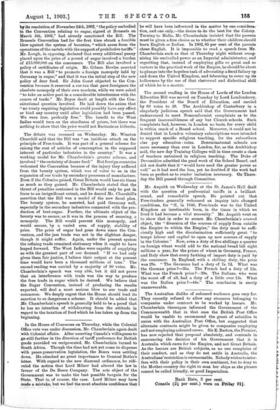The debate was resumed on Wednesday. Mr. Winston Churchill said
that the Bill was "an insidious attack on the principle of Free-trade. It was part of a general scheme for raising the cost of articles of consumption in the supposed interest of particular industries in the country." It was a working model for Mr. Chamberlain's greater scheme, and involved "the certainty of dearer food." But foreign countries welcomed the Convention because of the injury they suffered from the bounty system, which was of value to us in the expansion of our trade by secondary processes of manufacture. Even if the Colonies gained, Great Britain would lose six times as much as they gained. Mr. Chamberlain stated that the threat of penalties contained in the Bill would only be put in force to an insignificant extent, and he denied Mr. Churchill's assertion that the Bill was a model of the new fiscal plan. The bounty system, he asserted, had paid Germany well, especially in the secondary industries connected with the pro- duction of beet-sugar. Further, the ultimate object of the bounty was to secure, as it was in the process of securing, a monopoly. The Bill would prevent this monopoly, and would ensure, by a varied area of supply, stability of price. The price of sugar had gone down since the Con- vention, and the jam trade was not in the slightest danger, though it might suffer. Again, under the present system the refining trade remained stationary when it ought to have leaped forward. The West Indies were capable of supplying us with the greatest part of our demand. "If we had only given them fair justice, I believe their output at the present time would have been a thousand millions of tons." The second reading was carried by a majority of 80 votes. Mr. Chamberlain's speech was very able, but it did not prove that an interference with trade was the way to produce the free trade in sugar which he desired. We believe that the Sugar Convention, instead of producing the results expected, will deal a most serious blow to our trade and commerce. We deeply regret that the House should lend its sanction to so dangerous a scheme. It should be added that Chataberlain's speech is generally held to be a proof that he has no intention of withdrawing from the attitude in regard to the taxation of food which he has taken up from the beginning.






































 Previous page
Previous page